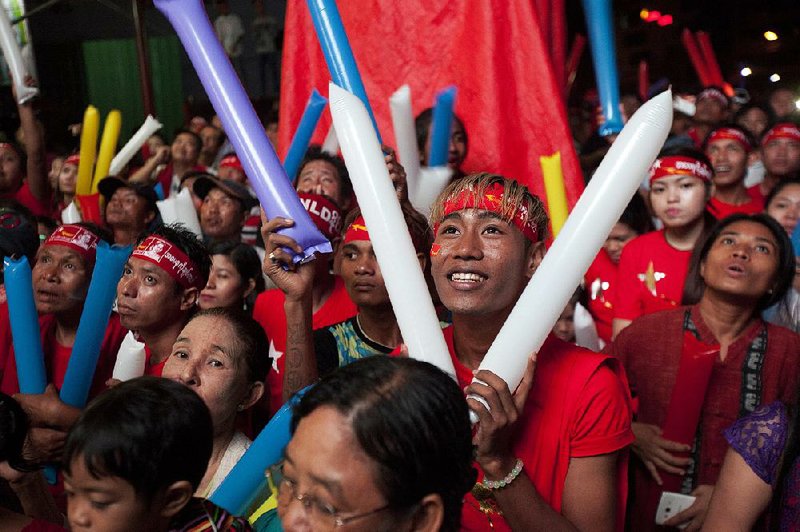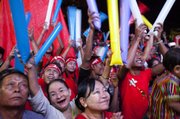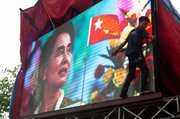RANGOON, Burma -- The party of Burma opposition leader Aung San Suu Kyi today accused the government election panel of intentionally delaying results that appear to show it winning a majority, saying the panel wants to "maybe play a trick."
The accusation by the National League for Democracy adds an uncertain twist to what has so far been an amicable election, where the ruling party appeared to be taking its expected loss gracefully.
"The Union Election Commission has been delaying intentionally because maybe they want to play a trick or something," National League for Democracy spokesman Win Htien told reporters at Suu Kyi's house after a party meeting. "It doesn't make sense that they are releasing the result little piece by piece. It shouldn't be like that."
The party had claimed victory Monday in the first four states where preliminary results of Burma's parliamentary election were known, giving supporters hope that the party will take the presidency and loosen the military's hold on the country.
The party said it had won 154 of the 164 seats in four states for which results are known. The Union Election Commission announced this morning that the National League for Democracy had won 11 of 15 seats in four other states, with the ruling party winning two and an ethnic party winning the remaining two.
The National League for Democracy has stationed representatives at counting centers and kept its own tallies. The election commission has been slower to release numbers from Sunday's election.
The National League for Democracy was running to take power from the ruling Union Solidarity Development Party, which is made up of former junta members who controlled the Southeast Asian country for a half-century and as a quasi-civilian government since 2011. Many of its leaders conceded defeat in their races.
Thura Shwe Mann, the speaker of the lower house of parliament and a former general, lost his seat, as did several high-profile ministers, most of them former generals.
"Nationwide, we won in some parts, and we lost in some parts," U Htay Oo, the chairman of the ruling party, was quoted as saying in Burmese media reports Monday. "But we had a greater share of losses."
He, too, lost his seat.
"You should never underestimate the people's desire," said U Khin Maung Yi, who defeated Htay Oo. "It is clear that people voted for us because they believe we can bring hope and change for them."
Aung Kyaw Kyaw, a 29-year-old pharmacist, said he didn't vote for the ruling party because "they were only former military people. If I voted for them, that means I am asking my own enemy to come back into my life."
"I want Mother Suu to win in this election," said street vendor Ma Khine, using a widely used nickname for the 70-year-old party leader. "She has the skill to lead the country."
The National League for Democracy would need a two-thirds majority in parliament for majority control over the executive posts under Burma's parliamentary-presidency system, which reserves a quarter of the 664 seats for the military.
The military and the largest parties in the upper house and the lower house will each nominate a candidate for president. After Jan. 31, all 664 legislators will cast ballots, and the top vote-getter will become president. The other two will be vice presidents. A large majority in Parliament would allow the National League for Democracy to take the presidency and one of the vice presidential slots.
Capturing the presidency and parliament would give the party power over legislation, economic policy and foreign relations, although the constitution guarantees that the military will keep control of the ministries of defense, interior and border security. The military also has the power to block constitutional amendments.
A constitutional amendment bars anyone with a foreign spouse or child from being president or vice president, meaning that Suu Kyi is not eligible for those posts. Her two sons are British, as was her late husband.
Suu Kyi has said, however, that she will act as the country's leader if her party wins the presidency, saying she will be "above the president."
Suu Kyi was cautious in comments to reporters Monday, but she hinted at big gains, saying voters had "already understood" the result.
"The loser must face the loss bravely and calmly, and the winner must be humble and very magnanimous," she said.
In Washington, White House spokesman Josh Earnest praised the "meaningful, competitive election" as an "important step in Burma's democratic reform process."
But Earnest also noted "structural and systemic flaws" in Burma's system, pointing to the laws preventing Suu Kyi from becoming president.
"There are some imperfections -- to put it mildly. There's also no denying the rather dramatic change we've seen inside of Burma," he said in a statement.
The U.S. Embassy had teams of observers in every state and region of the country Sunday. In a congratulatory statement, Secretary of State John Kerry warned that "a peaceful post-election period is crucial for stability" and for the political transition.
Assistant Secretary of State Daniel Russel, the top U.S. diplomat for East Asia, said the U.S. and other countries will hold military chiefs to their commitment to honor the results of Sunday's vote.
Russel stressed that information about the election was still coming in, but he said the main nongovernmental election-monitoring group had reported no significant instances of violence or interference with the voting process.
He said the coming weeks will be a delicate and important time, and he called on Burma's political leaders to cooperate to ensure the political process is orderly and peaceful as a new government is formed.
United Nations Secretary-General Ban Ki-moon congratulated Burma's voters for their "patience, dignity and enthusiasm," according to a statement from the office of his spokesman.
Burma's junta, which seized power in a 1962 coup, annulled election results when Suu Kyi's party won a sweeping victory in 1990. A new vote was held in 2010, but the opposition boycotted it, calling the election laws unfair.
The Union Solidarity Development Party won by default and took office in 2011 under President Thein Sein, a former general who implemented political and economic measures to end Burma's isolation and jump-start its economy. But the Union Solidarity Development Party was battered in a 2012 by-election in which the National League for Democracy won 43 of the 44 parliamentary seats for which it had candidates.
Information for this article was contributed by Esther Htusan, Vijay Joshi, Grant Peck, Shonal Ganguly, Cara Anna, Kathleen Hennessey and Jocelyn Gecker of The Associated Press; and by Thomas Fuller, Wai Moe, Saw Nang, Eaint Thiri Thu and Adam Dean of The New York Times.
A Section on 11/10/2015


